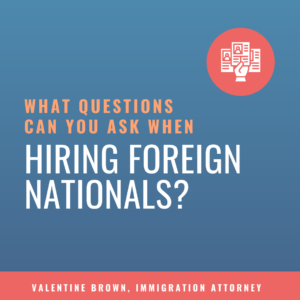Hiring season is fraught with questions and uncertainties; preparing employment applications; interviewing, drafting offer letters….. What questions can be asked? What questions should be asked? These concerns are even more pronounced when it comes to immigration status, and immigration sponsorship. Those tasked with the hiring process often ask, whether it is legal to ask applicants about their immigration status, how to ask that question, and even more important, “Do we have to sponsor for immigration status if the applicant needs it?”
When considering the basics, including what questions can be included on an application or at an interview, there are two questions that can, and generally should be asked: 
-
- Are you legally authorized to work for any employer in the United States?
- Do you now or will you ever require immigration sponsorship to maintain your legal work authorization?
Asking applicants whether they now need or will ever need immigration sponsorship in the future may seem a little intrusive, but this is the most important question a University can ask. With this information, the University can make an informed decision on the full costs and risks of considering this particular hire. There is no requirement that a university or any other employer sponsor a particular employee for temporary immigration status, such as an H-1B, or for green card status. This is an organizational decision that should be based on many factors including need for the individual, timing, costs, likelihood of a successful immigration outcome etc.
Once the applicant discloses an immigration status and the need for sponsorship, either voluntarily through the application process, employers can and should follow up to learn more information about the following factors:
-
- What is the applicant’s current immigration status?
- If the applicant has work authorization, what is the expiration date of that work authorization?
- What, if any opportunities exist to extend this work authorization without university sponsorship?
- If on a time – limited status, such as H-1B, how much time does the applicant have available on that visa status?
Once the organization has the answers to these basic questions, then the real question can be considered : Are we able and willing to be the applicant’s immigration sponsor, if we make the offer? The primary factors to consider are the following:
- Available funds, the cost of initial sponsorship and the cost of long term immigration sponsorship, which could include multiple H-1B applications and eventually, green card sponsorship;
- Potential success of immigration sponsorship: success will depend upon many factors including, salary, position requirements, title and job description, tenure track or not, administration v. faculty and many others;
- Types of Visas/Green Cards that are available/not available based upon organizational status (e.g. for profit v. not for profit);
- Timing of USCIS application processing versus any required employment start dates;
- Long Term prospects and available time to obtain ultimate green card approval.
Once a foreign national makes it through the initial application process and is in final consideration for a post, it is advisable to talk through the factors listed above with immigration counsel. Having all the facts and being able to provide them to the final decision makers before an offer is made goes a long way in avoiding confusion and questions later.
For more information on immigration and hiring, please reach out to Valentine Brown.
